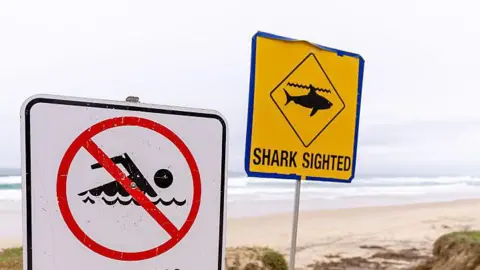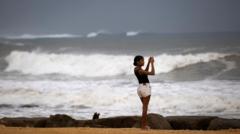On February 7, a beach on Providenciales in the Turks and Caicos Islands became the scene of a shark attack when a tourist attempting to photograph a six-foot shark was bitten. According to local government officials, the woman was promptly treated at a hospital before being evacuated from the island for further medical care.
The Department of Environment and Coastal Resources reported that the tourist was engaging with the shark in shallow waters when the incident occurred. The species of the shark involved remains unidentified. Following the bite, authorities closed the beach temporarily but reopened it shortly after, once the shark had moved to deeper waters.
Providenciales is renowned for its stunning beaches and is a popular destination for snorkelers and vacationers who often encounter marine life. Shark bites, while alarming, are considered rare events, with experts noting that they usually occur when sharks mistake humans for prey.
Gavin Naylor, director of the International Shark Attack File at the University of Florida, emphasized that it is too early to determine if this incident was provoked or unprovoked. Last year's shark attack statistics recorded 88 confirmed or possible bites in total globally, with some being provoked due to human intervention.
Conservationist and fisherman Chris Stefanou noted that sharks might confuse objects like cameras for their natural prey, saying, “The shark didn’t just see a human: ‘Ooh, I’m hungry, I want to go take a bite.’ That did not happen.”
Interestingly, this incident wasn’t isolated. On the same day, two individuals were reportedly injured in a shark encounter in Bimini Bay, Bahamas, prompting Naylor to highlight the rarity of two bites within the Caribbean on the same day. However, the overall data from last year indicates a decrease in unprovoked shark bites, suggesting that while caution is necessary, the risks may be minimizing.
The Department of Environment and Coastal Resources reported that the tourist was engaging with the shark in shallow waters when the incident occurred. The species of the shark involved remains unidentified. Following the bite, authorities closed the beach temporarily but reopened it shortly after, once the shark had moved to deeper waters.
Providenciales is renowned for its stunning beaches and is a popular destination for snorkelers and vacationers who often encounter marine life. Shark bites, while alarming, are considered rare events, with experts noting that they usually occur when sharks mistake humans for prey.
Gavin Naylor, director of the International Shark Attack File at the University of Florida, emphasized that it is too early to determine if this incident was provoked or unprovoked. Last year's shark attack statistics recorded 88 confirmed or possible bites in total globally, with some being provoked due to human intervention.
Conservationist and fisherman Chris Stefanou noted that sharks might confuse objects like cameras for their natural prey, saying, “The shark didn’t just see a human: ‘Ooh, I’m hungry, I want to go take a bite.’ That did not happen.”
Interestingly, this incident wasn’t isolated. On the same day, two individuals were reportedly injured in a shark encounter in Bimini Bay, Bahamas, prompting Naylor to highlight the rarity of two bites within the Caribbean on the same day. However, the overall data from last year indicates a decrease in unprovoked shark bites, suggesting that while caution is necessary, the risks may be minimizing.



















